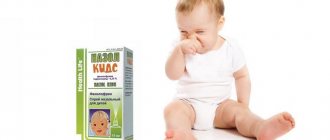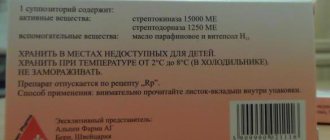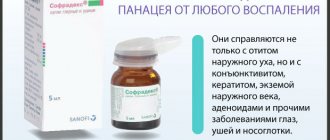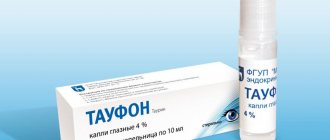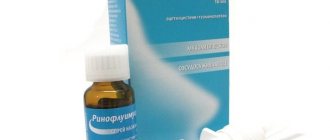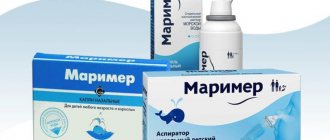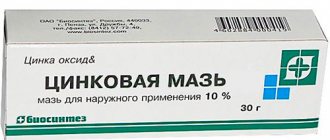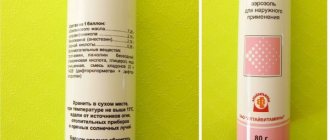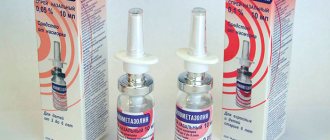Xylene is a nasal drop or spray based on xylometazoline, belonging to the group of adrenergic agonists.
It should be remembered that vasoconstrictor pharmacological agents do not treat a runny nose (rhinitis). Their main task is to facilitate the patient’s breathing by narrowing the vessels located in the nose and reducing the volume of secretion produced by the mucous membrane.
Due to its low cost and fairly high efficiency, Xylen is today one of the most popular nasal medications sold in pharmacies.
It has good reviews among both otolaryngologists and patients.
The retail price of this medicine is 22-80 rubles.
Pharmacological action of Xylene
According to the instructions, Xylen has an anti-edematous effect due to its local vasoconstrictor effect. When the blood vessels of the nasal mucosa are narrowed, swelling and hyperemia are reduced, and the patency of the nasal passages is restored, which facilitates nasal breathing and relieves nasal congestion. Xylene begins to have an effect almost immediately after application, the effect lasts up to 10 hours.
Since the drug is used topically, it is practically not absorbed into the blood. Modern methods cannot detect its concentration in the blood after use.
Xylene
Xylene (active ingredient - xylometazoline) is a local vasoconstrictor from the group of alpha-adrenergic agonists for use in otolaryngological practice to facilitate nasal breathing. The nose, along with the throat, actually serves as an entry gate for infection to enter the body. It is the nasal cavity that is the very “Brest Fortress” that takes the main viral-bacterial “artillery” blow. In this regard, one of the most pressing issues in the autumn-winter period should be considered the relief of cold symptoms and improving the quality of life if the infection has not passed you by. The reason for the surge in acute respiratory infections is a number of factors, including the accumulation of “sneezing and coughing” masses of people in enclosed spaces, hypothermia, seasonal weakening of the immune system, the functioning of the heating system, etc. Thus, central heating contributes to a catastrophic decrease in humidity, as a result of which the mucous membrane of the nasal cavity dries out, its blood supply deteriorates and makes it more defenseless for viral and bacterial infections. All this greatly increases the chances of pathogenic microorganisms safely passing the mucous membrane of the nasal cavity and oropharynx and systemically penetrating the body. The first alarm bells of an infection are rhinorrhea, swelling of the nasal mucosa and difficulty in nasal breathing - in other words, everything that is popularly called a runny nose, and in the international classification of diseases - acute rhinitis. Despite all the unpleasantness of its manifestation, it is necessary to point out that by running the nose and sneezing, the body tries to protect itself from foreign particles. The secretion secreted by the mucous membrane contains immune system factors such as the enzyme lysozyme and leukocytes. They protect the body from viral and bacterial invasion. Against the backdrop of a developing disease, the nasal mucosa is forced to literally work for wear and tear. Blood vessels dilate to allow air in the nasal passages to warm up more quickly and transport white blood cells to their destination.
As a result, swelling of the mucous membrane develops, which causes the same difficulty breathing characteristic of a runny nose. To more effectively remove foreign agents, mucus production increases significantly. Thus, during rhinitis, the human nasal mucosa is capable of producing about 1.5 liters of mucus per day. However, it is obvious that it is quite difficult to sit with your hands folded when it is pouring from your nose like a bucket, and you can only breathe through your mouth. In this regard, the pharmacological industry has created a huge number of drugs that can relieve cold symptoms and facilitate nasal breathing. One of these drugs is the domestic anticongestive drug xylene. When it comes into contact with the mucous membrane of the nasal cavity, it causes vasoconstriction, as a result of which the blood flow to its inflamed areas decreases and the swelling resolves. When applied topically, xylene is practically not absorbed into the systemic circulation, which minimizes its side effects. Moreover, the concentrations of xylometazoline, the active ingredient of the drug, are so low that they cannot be determined by modern analytical methods.
Xylene is available in two dosage forms: nasal drops and spray. The duration of use of the drug is on average from 7 to 14 days. The specific therapeutic dose is determined by the dosage form currently used and the age of the patient. Xylen should be prescribed with caution in children under 2 years of age. The same applies to pregnant or lactating women, who can use the drug only in cases where the expected benefit to the mother outweighs the potential risks to the child or fetus. The drug is not recommended to be taken for a long period of time, for example, when rhinitis has become chronic. Xylene is incompatible with monoamine oxidase inhibitors and tricyclic antidepressants.
Contraindications
This drug is contraindicated in case of hypersensitivity to its components, with severe atherosclerosis, arterial hypertension, tachycardia and glaucoma.
Xylene is contraindicated for use in patients with atrophic rhinitis, as well as in patients who have a history of surgical operations on the meninges. Children under 6 years of age are contraindicated from using a 0.1% solution of this drug; a special children's dosage (0.05% solution) should be used.
Xylen should be used with extreme caution in patients with diabetes mellitus, prostate hyperplasia, hyperthyroidism, and coronary heart disease. If there are contraindications to Xylene, you should not use this drug on your own; discuss treatment with similar medications with your doctor.
Indications for use
Xylen's instructions prescribe taking it:
- for acute respiratory diseases (ARI) with a runny nose;
- for all types of acute sinusitis (frontal sinusitis, sinusitis and others);
- for hay fever (hay fever);
- for all types of rhinitis (vasomotor, acute, chronic, allergic);
- with otitis media;
- to facilitate the diagnostic procedure of the upper respiratory tract (including rhinoscopy).
Remember that before using the medicine, you need to thoroughly clean both nostrils of mucus. Otherwise, the drug will not have normal access to the nasal mucosa and the effect of its instillation will not be complete.
Interaction with other drugs
Nasal drops cannot be used together with selective serotonin reuptake inhibitors. If the patient was treated with these medications, then therapy using Xylene should be carried out 14 days after stopping use. Also, the use of other adrenergic agonists or inhibitors with maprotoline is not permissible. For allergic rhinitis, it can be combined with oral antihistamines.
During treatment, patients may experience a depressive and apathetic state, and dizziness. Therefore, you should refrain from driving a car or operating complex mechanical devices that require great concentration. For chronic rhinitis, it is not recommended to treat with Xylene nasal drops, in order to avoid the body becoming addicted. For colds, when crusts appear in the nose, it is advisable to use the drug in the form of a gel.
Keep out of the reach of children at a temperature of +17 degrees. After use, screw the cap tightly. Do not store in the refrigerator or in direct sunlight. The shelf life is 3 years. It is prohibited to use expired goods.
Side effects and reviews
First of all, it is worth talking about the occurrence of a certain discomfort in the nasal cavity associated with dryness and irritation of the mucous membrane. Local tingling and burning may be felt.
If there is a serious deviation from the requirements of the instructions for using Xylene, the following may appear:
- nausea and vomiting;
- headache;
- swelling of the nasal mucosa;
- cardiopalmus;
- increased blood pressure;
- sleep disorders;
- depressive states.
It is quite possible to effectively treat swelling of the nasal mucosa yourself at home.
If you experience any discomfort from using the drug, you should immediately stop taking it and consult a doctor.
When used correctly, Xylene copes well with its main task, namely, it narrows the nasal vessels and makes breathing easier during a runny nose. This medicine generally has positive reviews.
In any case, the choice of medication for the treatment of rhinitis and sinusitis (sinusitis and sinusitis) should be entrusted to a doctor. Blindly following the recommendations and reviews of neighbors and relatives can have extremely dire consequences for your health.
Dosing drops for adults and negative consequences
Xylene 0.1% is indicated for adolescent children and adults. Use up to two times a day, two drops. The duration of treatment is determined by the attending physician based on the individual characteristics of the patient’s body, the severity and type of the disease. But you should remember that using the product for more than 5 days is strictly prohibited.
Long-term use of the medicine may cause the body to become addicted. As a result, achieving this will require exceeding the dosage and increasing the frequency of use of the drug, which is extremely dangerous for the patient’s health.
If used incorrectly, the following side effects may occur:
- Increase in exudate volume.
- Sneezing.
- Drying of the mucous membranes of the nasal cavity.
- Allergic manifestations.
Exudate
Patients are advised to refrain from driving a vehicle and operating complex mechanical devices that require increased concentration while taking it.
Symptoms of overdose are observed in rare cases when the patient does not comply with the recommended dosage. Symptoms also occur in cases where the drug has been used for more than two weeks. Against the background of excessive ingestion of the active component into the body, dizziness and depression develop. Side effects are not dangerous to the life and health of the patient and go away on their own some time after stopping the medication.
Overdose is also accompanied by the following symptoms:
- Painful sensations in the back of the head and temples.
- Depressive disorders.
- Dizziness.
- Increased blood pressure.
- Prostration.
If signs of overdose appear, you should stop using the drug and consult a specialist. If necessary, symptomatic treatment is required.
Recommended dosages
For adults and children over 6 years of age, drip 2-3 drops or make 1 injection into both nasal canals 3 times a day of adult preparations.
Children under 6 years of age (including newborns up to 1 year old) drip 1-2 drops into both nasal canals 1-2 times a day of children's drops.
Nasal gel can only be used by adult patients or children over 7 years of age. You need to put a little gel as deep as possible in both nostrils. Repeat the procedure no more than 4 times a day.
Analogs of Xylene nasal drops
There are many xylometazoline preparations in pharmacies. Therefore, there will be no difficulties when purchasing. Similar in composition to Xylene drops
| A drug | Active substance | Description | Manufacturer | Price |
| Galazolin | xylometazoline hydrochloride | For a runny nose, it is prescribed for children over 2 years of age; contraindicated during pregnancy; Use with caution when breastfeeding | Warsaw Pharmaceutical Plant Polfa | Average price 25-30 rubles |
| Xymelin | xylometazoline | Prohibited for children and in the first trimester of pregnancy | Takeda GmbH, Germany/Austria | 50-60 rubles |
| For the nose | xylometazoline | Drops are allowed for children over 2 years old; contraindicated for pregnant and lactating women | Sandoz Private Limited, India | 45 rubles |
| Otrivin | xylometazoline | Approved for the treatment of children over 12 years of age; prohibited during pregnancy and breastfeeding | Novartis Consumer Health S.A., Switzerland | Average price 80-85 rubles |
| Nazivin | oxymetazoline | Suitable for use in children over 2 years of age; pregnant women should use without exceeding the dosage | Merck KGaA (Germany) | Average price 130 rubles |
| Tizin | xylometazoline | Allowed for children over 2 years old; not recommended for pregnant women | Heinrich Mac Nasl. GmbH & Co. KG, Germany | Average price 70 rubles |
| Farmazolin | xylometazoline hydrochloride | Allowed for pregnant women and children over 2 years old | Farmak Ukraine | Average price 40 rubles |
This is just a part of similar products with a gentle effect and low cost. In severe cases, when a runny nose does not clear up on its own within 10 days, your doctor may prescribe an antibiotic or dexamethasone.
Composition and release form
The main active ingredient is xylometazoline hydrochloride. The medicine also includes:
- purified water solvent;
- stabilizer that removes toxins and improves blood circulation;
- benzalkonium chloride - has an antimicrobial effect.
In addition to drops, you can find Xylene nasal spray on sale, intended for instillation of the nasal passages. Drops, regardless of concentration, are contained in bottles made of polyethylene material with a volume of 10 ml. Colorless, have no odor.
The drug, available in green packaging, is intended for children, and in blue packaging for adults.
At the tip of the bottle there is a special nozzle in the form of a dropper for convenient dose calculation. Instructions are included which should be read before use.
Spray characteristics
The spray is designed for adults and children from 2 years old, the bottle holds 10 ml. solution. The active ingredient is xylometazoline. Has a direct effect on the nasal mucosa. Built-in dispenser sprayer for simplified use. Before administration, the nose must be cleared of mucous secretions using a saline solution. One injection is enough to achieve the effect. Perform the procedure 3 times a day, taking a break between uses of at least 7 hours.
Indications and restrictions
The medicine is prescribed in the presence of heavy discharge from the nasal passage, which is a consequence of respiratory and viral diseases. It helps reduce the amount of exudate and make breathing easier.
Due to the presence of these beneficial properties, Xylen is prescribed for the following diseases:
Sinusitis of various types.- Sinusitis.
- Otitis.
- Eustacheites.
- Hay fever.
- Sphenoiditis.
- Ethmoiditis.
- Acute rhinitis of viral or allergic nature.
- Allergic chronic rhinitis.
The medicine is also indicated in preparing the nasal cavity for diagnostic measures. The drug is also prescribed after surgery, when the operation was performed on the nasal area. The drug is also prescribed before diagnostic procedures such as rhinoscopy. The use of Xylene helps to obtain more accurate research data.
If otitis is established, when the inflammatory process affects the middle ear, drops are also instilled into the nasal passages to prevent the spread of infection and relieve nasal congestion.
Sometimes you can find recommendations for the use of Xylene as eye drops. But, based on the instructions for use, the use of the drug is not recommended in the presence of diseases of the visual system. In addition, one of the contraindications to the use of the drug is glaucoma. Therefore, experts categorically do not recommend dripping this product into the eyes.
The drug has a number of contraindications. All of them are divided into two large groups: absolute and relative. The first includes:
- Previous brain surgery.
- Breastfeeding period.
- Heart rhythm failure.
- Increased blood pressure.
- Atrophic form of rhinitis.
- Severe atherosclerosis.
- Early childhood (up to two years) when using the spray. 0.1% drops are not prescribed to children under 6 years of age.
- Glaucoma.
- Individual intolerance to the components of the drug.
Relative contraindications include the following diseases and disorders:
- Diabetes mellitus type 1 or 2.
- Hyperthyroidism. Thyroid dysfunction occurs when excessive production of T4 and T3 hormones occurs.
- IBS.
- Benign prostatic hyperplasia.
Hyperthyroidism
Medicine during pregnancy is prescribed exclusively according to the indications of a specialist. Before using drops or spray, the doctor must assess all the risks. In this case, women are strictly prohibited from exceeding the indicated dosages.
